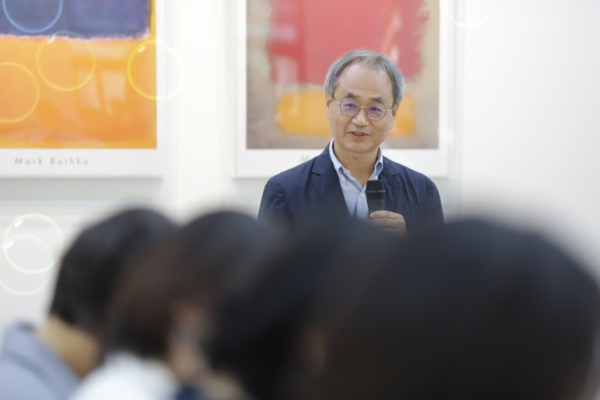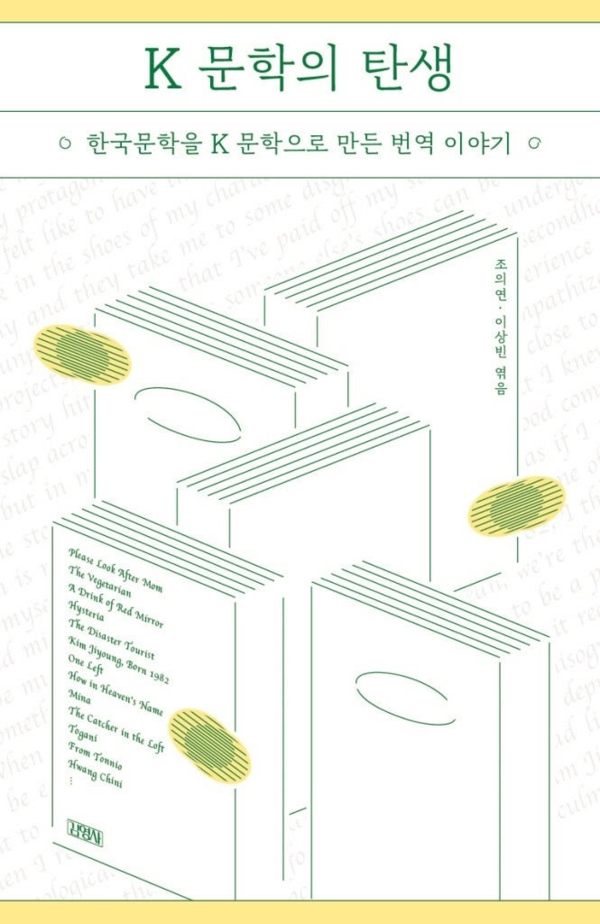
Professor Cho Eui-yon, who had been serving as a professor in the Department of English at Dongguk University for 35 years, has retired in August 2023. His expertise lies in pragmatics, and he has conducted research on language and translation phenomena based on inferential pragmatics. In addition to his academic roles, Professor Cho Eui-yon had experience as the advisor for the Dongguk Post, the university’s English press, and published a book titled <The Birth of K-Literature> in August. Through this article, the Dongguk Post would like to express gratitude for his dedication and extend congratulations on his retirement.
<Professor Cho Eui-yon’s farewell to Dongguk after 35 years of dedication>
Q1. Please introduce yourself.
Hello, I am Cho Eui-yon, Emeritus Professor of the Department of English Translation and Interpretation at Dongguk University. I am also an alumna of Dongguk University, having entered in 1977 and graduated in 1981. Then, in 1989, I officially joined Dongguk University as a professor of the English Literature major. Upon assuming the position of professor, I also took on the role of the head of the 100th-Anniversary Project Headquarters at Dongguk University. Serving as the head of the 100th-Anniversary Project Headquarters allowed me to learn a lot about the history of Dongguk University, and it remains one of the most memorable experiences during my time at Dongguk University.
Q2. Could you share your memories of what Dongguk University and the Dongguk Post was like back in the days?
At the time when I had just taken office, it was before the introduction of the division system. It was not the Division of English Language & Literature as it is now, but rather the English Language and Literature major. I also remember there was a movement for academic democratization. The academic democratization movement was essentially a demand for democratization within the university system, similar to students demanding democratization in society. Being a young professor in my twenties at that time, I remember students seeking the opinions of young professors like me regarding this movement.
Additionally, the relationship between the school and students was more adversarial compared to the present. The overall university atmosphere was more dynamic than it is now. Over the 35years since then, societal structures have changed significantly, and students have become more interested in areas such as personal growth and employment rather than societal innovation. It is a natural outcome, considering the changes in society. It just seems that the atmosphere was quite different from what it is now.
Shortly after starting to work for Dongguk, I took on the role of supervising professor for the Dongguk Post and worked there from 1989 to 1992 for approximately three years. It still is a special memory, as it was one of the first important duties I undertook after my official appointment. As you may know, the Dongguk Post was established by the Late Professor Song Yo-in. Professor Song Yo-in had a firm perspective on journalism, having written articles for external journals for decades. Many students took pride in receiving guidance from him, and while I may not have had the same level of influence, I made efforts to provide students with assistance, trying to follow his steps. Therefore, I focused not only on what articles students were writing but also on how they were growing as journalists.
Q3. Could you tell us a little about the book you recently published?
In August, I co-authored a book with Professor Lee Sang-bin titled <The Birth of K-Literature>. The book reflects the importance of translation in making Korean literature accessible to global readers, as Korean literature can only be experienced through translation. Traditionally, not only in literary translation but in the broader history of translation, the status of translators has been perceived as lower than that of the original authors. Translations were often considered subordinate to the original works. However, in the latter half of the 20th century, there has been an emphasis on the role of translators, marking the emergence of the concept of translator visibility.
In the context of Korean literature translation, the role of translators is immensely significant in bringing Korean literary works to a global audience. Despite this importance, there is a noticeable lack of research and popular literature addressing the stories of literary translators. Therefore, I aimed to create a book that caters to public demand by capturing their narratives. The book delves into the daily lives of translators who have been at the forefront of Korean literature translation, exploring the challenges they face and discussing the direction translation should take to make Korean literature more appealing to global readers.
There actually was not a specific motivation to publishing this book, but my decision to retire, did play a role in initiating this project. I have always sought opportunities where I could contribute, driven by the belief that as an intellectual who has grown through education and pioneering research, I should continuously give back to the society. So, around two years before my retirement, I began contemplating “What area can I contribute to?” Given my interest and previous research in literary translation, I resolved to publish a book that would document the stories of Korean literature translators.

Q4. As a professor in the Department of English, you observed the development of modern science and technology. In the era of AI, what direction do you think English translation should take?
Many of you are likely familiar with ChatGPT, which has been making waves lately. ChatGPT is an open artificial intelligence system, so unlike traditional technologies that operate with fixed information, ChatGPT continuously updates its information through the deep learning process. In fact, one could argue that ChatGPT has nearly rendered the role of translators obsolete. There are ongoing efforts to incorporate real-time translation capabilities into smartphones, essentially further diminishing the role of human interpreters. While there may still be variations across different domains depending on the amount of integrated data, technological advancements have progressed to the point where the role of humans in translation is becoming less essential, and this trend is expected to continue.
In fact, professors in the English translation and interpretation field have been giving considerable thought to these developments. About four or five years ago, during an interview with a major daily newspaper, I remember saying that machine translation’s accuracy was so low, that the idea of not needing human translators and interpreters was considered a narrative crafted by those favoring machines. However, in just a short span of four to five years, technology has rapidly advanced, and the accuracy of machine translation has significantly improved.
Given the current landscape, I believe it is more crucial than ever for translation and interpretation educators to contemplate how their field should evolve. It is not something that can be achieved through individual efforts alone; collective intelligence is needed. The challenges posed by AI development are not limited to translation studies but are pervasive throughout the humanities subjects. Therefore, it is essential for forums to be established where professors can discuss the existential challenges of the humanities, how education should adapt to these challenges, and ultimately guide students in envisioning the future.
Q5. Congratulations on your retirement! Could you share your thoughts?
Thank you, Retirement holds two meanings for me. Metaphorically, I see retirement as both opening the door and stepping out of a room, as well as opening the door and entering a new room. It involves tidying up and concluding the familiar space, preparing to enter a new world. So, before I open the door and step out, I am taking the time to reflect on my contributions, contemplate the path I have walked, and engage in self-reflection. Additionally, I am also spending time thinking about what I will do as I open a new door and enter a new phase.
I do not have any specific post-retirement plans yet, but I am considering starting a blog, documenting and organizing new things I learn. Until now, I have dedicated a lot of time and interest to external factors such as research subjects and achievements. However, now I am planning to focus more on the internal side. It may sound a bit philosophical, but I want to explore questions like, “What is the purpose of my actions?”
As the Dongguk Post wraps up the interview, Professor Cho delivered some last words to students.
“To all students, I emphasize the profound importance of connecting with your professors. Beyond the structured confines of classrooms and scheduled lectures, there exists an invaluable opportunity for personal and academic growth through visits to their research offices. I encourage you not only to participate actively in class but also to take the initiative in visiting their research spaces, engaging in personal conversations, and sharing your own stories.”
The Dongguk Post would like to express gratitude for his dedication and congratulate him on this milestone, while also acknowledging the though-provoking insights he shared on the evolving landscape of English translation in the era of AI. As Professor Cho Ui-yon enters a new chapter, his legacy as an educator and his perspectives on the intersection of technology and humanities will undoubtedly resonate with the ever-changing academic landscape. We wish him continued success and fulfillment in his future endeavors.
Dear Professor, thank you and farewell!

